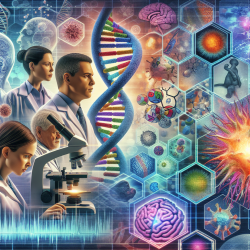Autism Spectrum Disorder (ASD) is a complex neurodevelopmental condition that affects social interaction, communication, and behavior. While genetics play a crucial role in ASD, the specific genetic underpinnings remain incompletely understood. Recent research conducted in Vietnam has shed light on the role of de novo copy number variations (CNVs) in ASD, offering new avenues for diagnosis and treatment.
Understanding De novo CNVs in ASD
The study titled "De novo copy number variations in candidate genomic regions in patients of severe autism spectrum disorder in Vietnam" provides valuable insights into the genetic landscape of ASD among Vietnamese children. This research identified 118 de novo CNVs from a cohort of 100 ASD patients, with six classified as pathogenic. Notably, three patients exhibited deletions involving the SHANK3 gene, a finding that stands out due to its higher frequency compared to other populations.
The Significance of SHANK3 Gene Deletions
The SHANK3 gene plays a critical role in synaptic function and is associated with Phelan-McDermid syndrome, a condition often characterized by ASD-like symptoms. The study's discovery of a 3% frequency of SHANK3 deletions among Vietnamese patients suggests a potentially higher prevalence of this syndrome in East Asian populations. This finding emphasizes the importance of considering ethnic-specific genetic variations when diagnosing and managing ASD.
Implications for Practitioners
- Enhanced Diagnostic Tools: The identification of specific CNVs associated with ASD highlights the potential for developing targeted genetic tests. Practitioners can incorporate CNV analysis into their diagnostic toolkit, particularly focusing on SHANK3 deletions for early detection.
- Personalized Treatment Approaches: Understanding the genetic basis of ASD can inform personalized treatment plans. For example, recognizing SHANK3-related cases may guide interventions such as behavioral therapies or emerging treatments like stem cell therapy.
- Cultural Sensitivity in Diagnosis: As genetic variations can differ across populations, practitioners should be aware of cultural and ethnic factors that may influence the presentation and diagnosis of ASD.
Encouraging Further Research
This study underscores the need for continued research into the genetic factors contributing to ASD. Researchers are encouraged to explore:
- Population-Specific Genetic Studies: Expanding research to include diverse populations can uncover unique genetic markers and improve global understanding of ASD.
- Longitudinal Studies: Following individuals with identified CNVs over time can provide insights into the progression and management of ASD.
- Treatment Efficacy: Investigating how genetic profiles influence treatment outcomes can enhance therapeutic strategies for individuals with ASD.
Conclusion
The findings from this Vietnamese study offer promising directions for improving the diagnosis and management of Autism Spectrum Disorder. By integrating genomic insights into clinical practice, practitioners can better tailor interventions to meet the needs of individuals with ASD. As research continues to evolve, collaboration between scientists and clinicians will be key to unlocking new possibilities for those affected by this complex condition.
To read the original research paper, please follow this link: De novo copy number variations in candidate genomic regions in patients of severe autism spectrum disorder in Vietnam.










